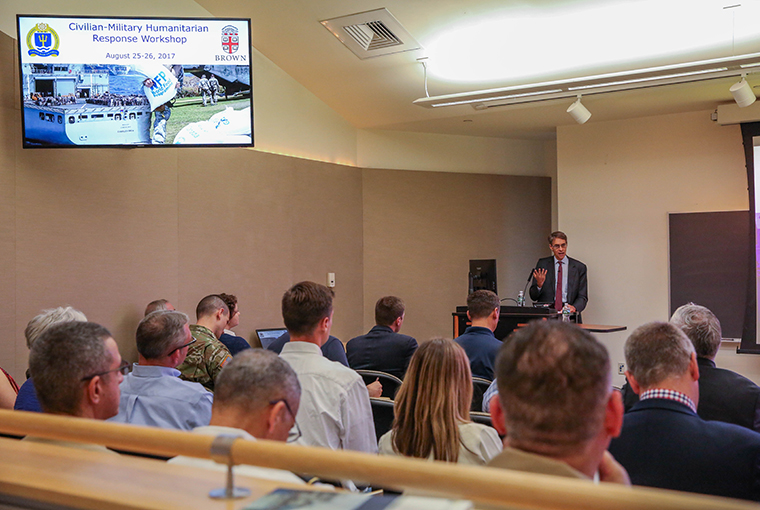Civilian-Military Humanitarian Response Workshop: August 2017

About this Event
Event Information
Public Affairs Office
This event is not open to the general public
This event is for Naval War College students, faculty and staff.Over 100 participants - including humanitarian practitioners, academicians and military leaders - gathered at Brown University in Providence, Rhode Island to explore current and future challenges in civilian-military humanitarian responses including natural disasters, complex emergencies and routine military security cooperation activities.
The second in a planned series of civilian-military humanitarian-focused events, the workshop was designed to help the international humanitarian community, academia and international militaries collaboratively develop research, professional education, training and development agendas. Each of these entities plays a vital role in helping to improve civilian-military coordination and engagement during humanitarian responses.
Attendees enjoyed stimulating keynote and panel discussions from experts who explored the current and future state of civilian-military coordination. Speakers included: Kenneth Roth, Human Rights Watch; Julia Brooks, Harvard Humanitarian Initiative; Jason Mills, Médecins Sans Frontières, Nina Tannenwald, Brown University; and British Army Maj. Jennifer Maddocks, U.S. Naval War College.
Participants had thoughtful and constructive discussions over the course of two days including in many small group breakout sessions. The following eight working groups explored key areas of interest in the humanitarian ecosystem:
- Military integration into humanitarian response
- Global health engagements
- Gender and vulnerable people
- Information communications technologies
- Pandemics
- Urbanization
- International humanitarian law and attacks on aid workers
- Climate change and sea level rise
Downloads for this event
2017 Civilan-Military Humanitarian Response Workshop - Working Group Summary ReportMost Recent
8:00 a.m.
U.S. Naval War College, 686 Cushing Rd, Newport, RI 02841
U.S. Naval War College, 686 Cushing Road, Newport, RI 02841
U.S. Naval War College, 686 Cushing Road, Newport, RI 02841
8:00 a.m.
U.S. Naval War College, 686 Cushing Road, Newport, RI 02841
U.S. Naval War College, 686 Cushing Rd, Newport, RI 02841
